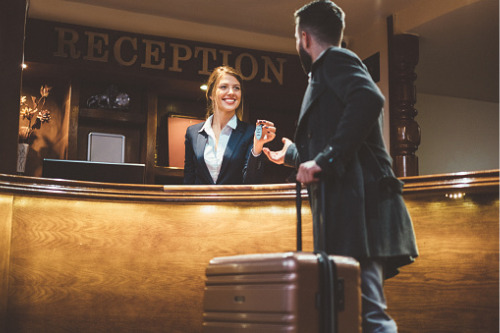“We are in the business of opening and running hotels, not closing them,” said RLJ Lodging Trust CEO Lesley Hale. “We had to develop a strategy to execute on that, because we don’t know how long this is going to last.”
In the first week of the pandemic, RLJ Lodging which has a portfolio of 103 hotels under brands like Hilton, Marriott, and Hyatt, suspended operations at 57 hotels. When demand began to rapidly freefall at the start of the pandemic, all hotels focused their attention on containing costs.
“Staffing represented about 48% of our cost load, we also reduced and closed food and beverage outlets as well as other services and shrunk the hotel, reducing the number of rooms available in an effort to control costs,” said Hale in a webcast hosted by Walker & Dunlop CEO Willy Walker.
STR’s latest data shows U.S. hotel gross operating profit per available room down 110%, a slight improvement from the month before. Limited-service properties shows positive profitability surpassing 45% occupancy. While profits are still down significantly, STR’s senior director of financial performance noted that trends point to more hotels reopening in May with the lower end of the market seeing less severe performance declines. Hale believes RLJ’s portfolio is well-positioned to survive, no matter what the shape of the recovery is.
“The types of hotels we focus on are profitable service and upscale limited-service hotels that are premium-branded, like Hilton Hyatt and Marriott. These are rooms-oriented products with high margins, and they’re located in the heart of demand. We believe that that’s the right way to play lodging, and more resilient model.”
Hale added that more than half of their portfolio are suites-oriented, which may be more attractive to consumers particularly in an environment of social distancing. Instead of spending time outside, private suites offer the ability to spend more time comfortably within a private space.
To date, about 20 out of the 57 RLJ hotels that suspended operations have reopened as demand picked up, particularly in ‘drive to’ markets. Leisure demand was the first to return, as individuals are getting tired of staying at home and shelter-in-place orders are starting to lift, while also coinciding with summertime.
Brand partners have been very collaborative and nimble on the cost side, Hale added, and have been flexible on waiving brand standards in order to try and control costs. The group is focused on partnering around cleanliness and addressing consumer expectations as people begin to get more comfortable with traveling again. Hale shared her thoughts on how the hotel experience will change for consumers in a post-COVID-world:
Lobby and public spaces
- There will be mandatory use of personal protection equipment (PPE) and a push toward mobile check-in to bypass the front desk and go straight to the room.
- Cleaning of area and high-touch points will be cleaned more frequently
- There will be less furniture in these common areas to dissuade people from congregating.
In room
- Rooms will be cleaned before guest arrives and won’t be cleaned again until after the guest leaves. This is a dramatic change compared to being cleaned every day.
Amenities
- Food and beverage will have more limited service offerings, including reduced capacity at hotel restaurants and bars.
- Services like valet parking will likely be eliminated so no one is in and out of a guest vehicle unnecessarily.
- In the gym, there will be signs on machines to remind patrons to distance appropriately
Which of these will be temporary and permanent?
Hale says changes related to technology will stay in place because people are making heavy investments around that right now, but changes related to room cleaning is yet to be determined.
Walker, who hosted the webcast says this situation is reminiscent of when pay-per-view services because obsolete since being replaced by television streaming sites like Netflix that are available simply by logging on to the free Wi-Fi, forcing hotels to replace those revenue streams. With these new measures in place, Hale says it will be difficult to replace the revenues lost in these common spaces.
“We believe people will travel again and we can eventually increase food and beverage. In the short run, given the situation, it will be a slow ramp up and will be impactful to our revenue source,” she said.

